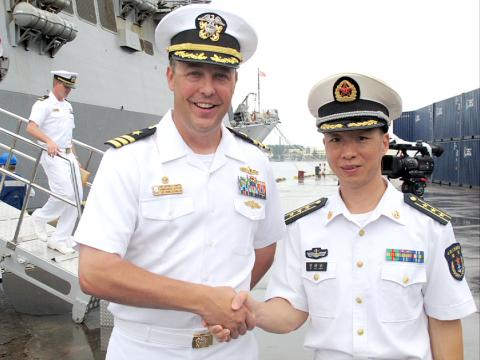A US Navy guided missile destroyer yesterday arrived in the northern Chinese port of Qingdao in the first visit by a US warship to the nation since Beijing responded angrily to an arbitration panel’s ruling that its expansive South China Sea maritime claims had no basis in law.
Arriving in the home port of China’s northern fleet, the USS Benfold held a signals exercise with the People’s Liberation Army Navy.
Speaking briefly to media, US Navy Commander Justin Harts said the visit aimed to “build relationships” with counterparts from the Chinese navy, but referred questions on tensions in the South China Sea to US Pacific Command in Hawaii.

Photo: AP
US Admiral Scott Swift, the top US naval officer in Asia, is to meet the media tomorrow in Qingdao.
China rejected last month’s ruling by the Permanent Court of Arbitration the The Hague, Netherlands, in a case initiated by the Philippines, and refused to take part in the arbitration.
It has strongly criticized the US for encouraging its treaty partner in taking legal action and calling for Beijing to respect the ruling.
Last week, Chinese Minister of Foreign Affairs Wang Yi’s (王毅) said the US, Japan and Australia were “fanning the flames” of regional tensions after they released a joint statement urging China not to construct military outposts or reclaim land in the disputed waters.
Since the ruling, China has repeatedly reasserted its historical claim to the virtually the entire strategically vital water body, its islands, reefs, plentiful fish stocks and other resources.
It has also begun flying air patrols, with one announced on Saturday featuring bomber and fighter aircraft, in the airspace around the Spratly Islands (Nansha Islands, 南沙群島), Scarborough Shoal (Huangyan Island, 黃岩島) and surrounding areas.
The Spratlys and Scarborough Shoal are claimed by Taiwan, China and the Philippines.
Brunei, Malaysia and Vietnam also claim the Spratlys.

CARROT AND STICK: While unrelenting in its military threats, China attracted nearly 40,000 Taiwanese to over 400 business events last year Nearly 40,000 Taiwanese last year joined industry events in China, such as conferences and trade fairs, supported by the Chinese government, a study showed yesterday, as Beijing ramps up a charm offensive toward Taipei alongside military pressure. China has long taken a carrot-and-stick approach to Taiwan, threatening it with the prospect of military action while reaching out to those it believes are amenable to Beijing’s point of view. Taiwanese security officials are wary of what they see as Beijing’s influence campaigns to sway public opinion after Taipei and Beijing gradually resumed travel links halted by the COVID-19 pandemic, but the scale of

TRADE: A mandatory declaration of origin for manufactured goods bound for the US is to take effect on May 7 to block China from exploiting Taiwan’s trade channels All products manufactured in Taiwan and exported to the US must include a signed declaration of origin starting on May 7, the Bureau of Foreign Trade announced yesterday. US President Donald Trump on April 2 imposed a 32 percent tariff on imports from Taiwan, but one week later announced a 90-day pause on its implementation. However, a universal 10 percent tariff was immediately applied to most imports from around the world. On April 12, the Trump administration further exempted computers, smartphones and semiconductors from the new tariffs. In response, President William Lai’s (賴清德) administration has introduced a series of countermeasures to support affected

Pope Francis is be laid to rest on Saturday after lying in state for three days in St Peter’s Basilica, where the faithful are expected to flock to pay their respects to history’s first Latin American pontiff. The cardinals met yesterday in the Vatican’s synod hall to chart the next steps before a conclave begins to choose Francis’ successor, as condolences poured in from around the world. According to current norms, the conclave must begin between May 5 and 10. The cardinals set the funeral for Saturday at 10am in St Peter’s Square, to be celebrated by the dean of the College

CROSS-STRAIT: The vast majority of Taiwanese support maintaining the ‘status quo,’ while concern is rising about Beijing’s influence operations More than eight out of 10 Taiwanese reject Beijing’s “one country, two systems” framework for cross-strait relations, according to a survey released by the Mainland Affairs Council (MAC) on Thursday. The MAC’s latest quarterly survey found that 84.4 percent of respondents opposed Beijing’s “one country, two systems” formula for handling cross-strait relations — a figure consistent with past polling. Over the past three years, opposition to the framework has remained high, ranging from a low of 83.6 percent in April 2023 to a peak of 89.6 percent in April last year. In the most recent poll, 82.5 percent also rejected China’s